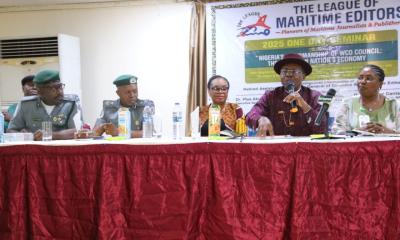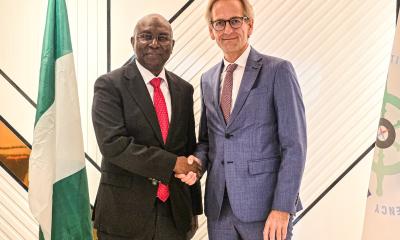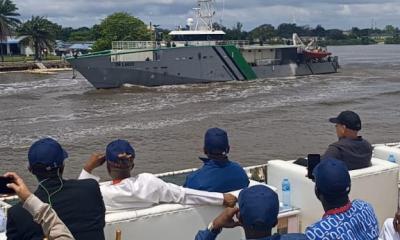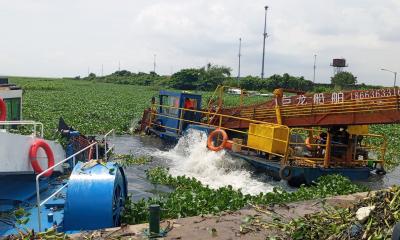Customs
CTN as panacea for insecurity, importation of contraband goods through ports.

Since the collapse of scanners at the nation’s seaports and land borders, the Nigeria Customs Service has been using manual method(100 percent examination) to inspect cargoes but experts believe that re-introduction of CTN at the ports would minimise the high incidence of insecurity through curbing of importation of arms and ammunitions through our ports into the country.
In 2015, the Nigerian Shippers Council was desirous to re-introduce the Cargo Tracking Note (CTN) into the nation’s maritime industry.
But, the Council at that time was interested in the overall national security and safety of Nigerians because it is believed that the CTN will help check importation of arms, ammunition and hazardous materials into the country.
For instance, in January 2017, the Federal Operations Unit (FOU), Zone A of the Nigeria Customs Service (NCS) intercepted 49 boxes containing 661 pieces of pump action rifles.
Thee boxes were concealed with steel and other merchandise goods.
Also in May, 2017, another 440 pump action rifles were intercepted at the Tin Can Island Command, Lagos.
According to the then Zonal Co-ordinator of the Zone, Monday Abue, the cargo was shipped into the country from Turkey and concealed in POP.
On the 7th of September, 2017 another 1,100 rifles were further intercepted in a 20ft container with No GESU2555208 during examination, while the Bill of Lading falsely indicated wash hand basins and water closets.
However, 2018 was not spared as the Customs Service intercepted live ammunitions at the Tin-Can island port.
The Tin-Can Island Command of the service said the live ammunitions were concealed in a vehicle and container at the Lagos Port.
It was gathered that the interception were done in two different operations on the 9th and 10th of July respectively.
According to the Public Relations Officer of the command, Uche Ejiesieme , the first incident at the Terminal ‘C’, involved 1 x 40ft container No. TGHU 60143419, which on scheduled examination was found to contain 150 rounds of live ammunition and jack knives while 149 rounds of 38mm calibre live ammunition, 92 rounds of 9mm calibre live ammunition, 2 rounds Of 7.62MM calibre live ammunition, 11 cartridges of live ammunition,12 expenses empty shells of various calibre and one empty magazine were uncovered in another vehicle.”
This is part of the few interceptions that were made by the service while many more may have eluded the eagle eye of the customs service.
But, stakeholders have argued that the CTN, if it had been implemented in 2015 ,would have detected the contrabands before it was loaded on vessels to Nigeria.
Even, the Central Bank of Nigeria agreed that the CTN would not only checkmate under declaration and share trade information but will also assist the Nigeria Customs Service to risk mitigation on imports, enhance and block revenue leakages at the ports.
Speaking, a frontline Importer, Ikechukwu Shedrack ,said the CTN would serve as a security measure to ensure safety and security of goods shipped from one part of the world to another.
“It is meant to be implemented worldwide. The regulation requires shippers to have a Cargo Tracking Note (CTN) accompanying all shipments.
“The CTN will help enhance security at a time Nigerian government is have difficulties in replacing obsolete scanners at the ports. It will give information of cargoes to be imported even before loading and it will help know what should be imported and what not to be imported into the country, especially if it were to be arms and ammunitions it will be intercepted at point of loading”
“Aside under declaration, the CTN will also bring trade information.
Research had also shown that the CTN, when reintroduced, is different from the old ways of monitoring cargoes as it has four distinct features from the previous tracking device.
It is noteworthy that, as can be seen from the agreement, four important features distinguish the current ICTN Scheme from the abolished version.
That is, the current scheme will be implemented at no cost to the shipper/consignee, at all and the current scheme is web based and therefore paperless,thus making the delay associated with obtaining Cargo Tracking Note and associated documentation by Shippers, under the abolished version of the scheme completely eliminated as the shipper needs not do anything apart from declaring in advance (i.e. at the loading port), information relating to the cargo.
Also, the one hundred and fifty dollars ($150) per container CTN fee charged under the abolished version, paid by the shippers, which led to the stakeholders vehement protest against the scheme and its eventual abolishment, was radically modified and reduced to a token administrative fee of twenty five dollars ($25) per container, thereby making it the lowest in our West and Central African Sub-region.
The NSC-TPMS Sharing Ration of the collectible Administrative fee was negotiated and reviewed from 60-40, under the abolished scheme, to 65-35 thereby raising the share accruable to the government.
Also, all vessels loading and unloading or in transit (Export/Import and Transit) departing from Nigeria Ports or having Nigerian Ports as final destination or transiting through Nigerian ports shall, before any movement, obtain a Movement Reference Number (MRN).
He said, “The Cargo Tracking Note would soon be reintroduced at a very negligible cost. CTN is a security thing because when we have it, there won’t be smuggling of firearms and all other contrabands.
Bello stated further that the CTN would also help the Standards Organisation of Nigeria (SON) and National Agency for Food Drugs Administration and Control (NAFDAC) to fight substandard products and fake drugs respectively.
“I am calling on all the port stakeholders such as manufacturers, shippers and the rest to support this. That is why the Nigerian Shippers Council wants to develop the port community system because what the port needs is unity.
Customs
Relief as Customs grants January 31st, 2026 extension for fast track operators to migrate to AEO

Customs
Again, Customs, NDLEA Collabo intercepts 2,374 packages of Canadian Loud at Apapa Port


Customs
Comptroller Aliyu vows to sustain onslaught on smugglers as he assumes duties at FOU A

-

 Headlines2 months ago
Headlines2 months agoNRC police tracks down mastermind of railway vandalism in Kaduna
-

 Customs3 months ago
Customs3 months agoBeyond euphoria of WCO chairmanship: Stakeholders urge Nigeria to translate global Customs ascendency to reformation of Port industry
-

 Headlines2 months ago
Headlines2 months agoDenmark, Nigeria seek new areas of collaboration on maritime development
-

 Headlines4 weeks ago
Headlines4 weeks agoEx-NIWA boss, Oyebamiji, emerges most media-friendly CEO in maritime industry
-

 Headlines3 months ago
Headlines3 months agoNigeria dazzles Dominguez, IMO scribe, with practical demonstration of deep blue assets capabilities.
-

 Headlines2 months ago
Headlines2 months agoWater Hyacinth: An imported invasive aquatic menace NIWA is determined to fight in Nigeria

